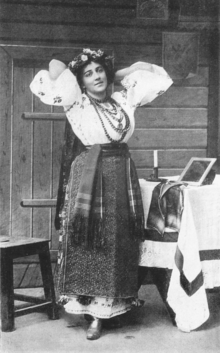The night before Christmas (Gogol)

Rimsky-Korsakov's opera
The Night Before Christmas in 1895 .
The night before Christmas , also Christmas Eve ( Russian Ночь перед Рождеством , Notsch pered Roshdestwom ), is a short story by the Russian writer Nikolai Gogol , which was written in 1830-1831 and published in 1832. The story was recorded in the second part of the evenings in the hamlet near Dikanka .
action
When the parish clerk left the Dikanka tavern on all fours, the moon cracked in the sky. The peasants whom the clerk told about it just laughed. But dark night fell over Dikanka since the devil had put the moon in his pocket. The evil one wanted to take revenge on the pious blacksmith and painter Wakula on the last night in which he was allowed to rule and rule on God's earth. The latter had painted the right side wall of the church vestibule with a mean caricature showing the expulsion of the devil.
In the dark, the devil estimated, the rich widowed Cossack Korniy Chub would not dare to leave the house. And Wakula usually went to see his beloved Oxana, Tschub's beautiful 16-year-old daughter, when her father went out.
Wakulas around 40-year-old mother Solocha, a devil woman, wanted to get close to Chub's wealth. In heavy night frost and snowstorms, Solocha came home, but not through the door, but together with her lover, the devil, after an aviation on the broom through the chimney. The moon came free and shone over Dikanka. The blizzard was over. Not only the devil was interested in the witch Solocha, but also the mayor of Dikanka. When he knocks, the devil hides in a blacksmith's coal sack. The mayor crawls into a sack of coal when the sexton requests admission and the sexton makes himself invisible in the same way as Tschub knocks.
Tschub had left the house despite the darkness, got lost in the Dikanka snowstorm and knocked on his own door first. Wakula opened the door to him, not recognizing the masked landlord and beating Oxana in anger over the course of his tête-à-tête. The blacksmith had been turned away by the beautiful woman - as usual. Oxana wanted to take the stubborn suitor as husband, but first he would have to give her a pair of gold-trimmed shoes from the Tsarina.
When the unsuccessful Wakula comes home grumpy, Tschub does not want to show himself to the “goddamn freak” and crawls into the sack's sack. The blacksmith throws the sacks in the snow. One, the one with the devil in it, he keeps on his shoulder. The evil one helps Wakula, flies with him to St. Petersburg to the Tsarina Katharina and demands the soul of the lover for it. Katharina gives the blacksmith a pair of her shoes.
Oxana has long since regretted her moods and is now madly in love with Wakula. The girl wants the returned blacksmith without gold-embroidered shoes. Wakula drives the devil out of Dikanka with a couple of juicy whips. The couple get married and have a child.

Adaptations
Opera
- 1887, Bolshoi Theater , Moscow : Slipper - comic opera in four acts by Peter Tchaikovsky .
- 1895, Mariinsky Theater , St. Petersburg : The night before Christmas by Nikolai Rimsky-Korsakov .
Movie
- 1913: The night before Christmas - silent film by Władysław Starewicz
- 1944: Tscherewitschki - film opera by Michail Schapiro
- 1951: The night before Christmas - animated film by Walentina Brumberg
- 1962: The Night Before Christmas - directed by Alexander Rou
- 1997: The night before Christmas - animation by Ekaterina Mikhailova
- 2002: Evenings in the hamlet near Dikanka - musical by Sergei Jegorow
Used edition
- The night before Christmas. German by Korfiz Holm . P. 229–299 in Johannes von Guenther (Ed.): Nikolai Gogol: Gesammelte Werke. Volume I. Aufbau-Verlag, Berlin 1952
Web links
- The text
- online in the Gutenberg-DE project , 1962 Gutenberg Book Guild , translator: Alexander Eliasberg
- Wikisource: Ночь перед Рождеством (Гоголь) (Russian)
- online in Lib.ru (Russian)
- online in FEB (Russian)
- online in the Komarow library (Russian)
- online at RVB.ru (Russian)
- Gogol bibliography, entry Ночь перед Рождеством (Russian)
- Reference in the laboratory of fantasy (Russian)
Individual evidence
- ↑ Russian Mrawina, Evgenija Konstantinowna (1864–1914)
- ↑ Russian shoes with laces